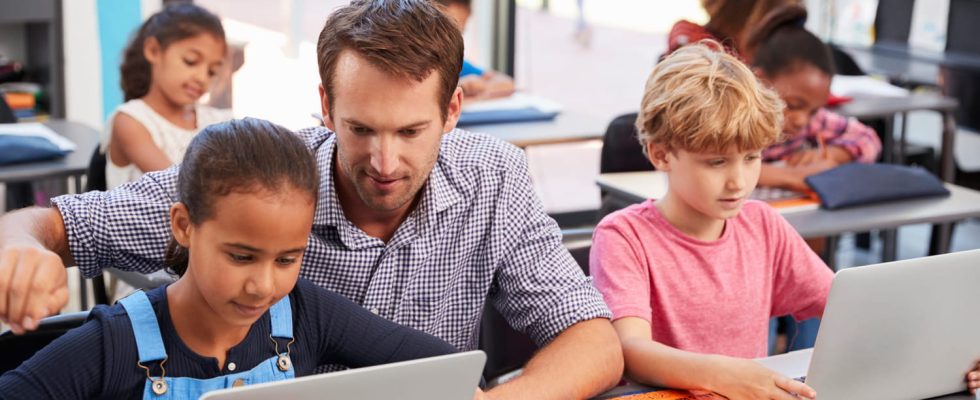According to renowned futurist Tracey Follows, artificial intelligence and virtual reality will completely redefine school in 2050 with immersive and personalized lessons. Here are his five predictions about the school of the future.
What will school look like in 2050? The tutoring platform GoStudent and Tracey Follows, cited among the 50 futuristic women in the world in Forbes, took a close interest in this and jointly published a white paper entitled “Education in 2050: the end of the school as we know it today”. In this guide, the experts have made several predictions about the future of the education system. According to their findings, new technology will have a central role in education. Artificial intelligence (AI) or virtual reality (VR) will completely reinvent the way of learning and will also replace traditional classrooms. Here are the 5 upheavals that await schoolchildren in 2050:
1 – The choice of subjects defined by the AI according to the passions of the students
Today, instruction is mainly based on a school curriculum decided by the Ministry of Education, but also on the skills sought by employers. In 2050, it will be the passions and goals of each student that will be at the heart of learning. AI will be used by teachers to define the choice of subjects and the pace of student learning. According to specialists, in Taiwan, the authorities are already experimenting with this type of learning. Pupils are encouraged from the age of 7 or 8 to follow their interests and set their future plans.
In the future, experts believe genetics could be incorporated to better identify potential abilities in schoolchildren and guide them towards trades for which they would find it easier. “It could become compulsory for learners to take at least one subject in which their DNA test suggests they will excel. DNA-based analysis and assessment will never tell the whole story, but combined, for example, with psychometric tests, they could identify certain characteristics, talents or roles for which students might have a predisposition.“, says the report.
2 – Virtual reality will come into classrooms
According to Tracey Follows, classrooms, as we have known them, will be replaced in 2050 by immersive virtual environments. Concretely, the courses will be provided by professors or academics, but thanks to VR for example, students will be able to learn about astronomy by being virtually in space or on a spacecraft. Students can also follow the lessons of famous historians or scientists of the past, thanks to digital characters generated by AI. With these new environments, all students will have access to high-level studies.
3 – A continuous evaluation, with personalized vacations
In the school of the future, the controls will be continuous and based on the skills of the students, predict the specialists. Each pupil will also have the right to personalized breaks throughout the year, whenever needed, through mental health monitoring. Teachers will thus be able to use neurotechnologies (in the form of glasses, helmets, headphones) to monitor the cognitive health of learners and thus detect if the student is burning out or if he is under pressure.
4 – Robotics, quantum information… What new materials in 2050?
Future students should learn new skills and new specialties related to future technologies. By 2050, courses on advanced robotics, genetic engineering, or even quantum information can be taught to students. These subjects will be common in the future, along with French and mathematics, and will be increasingly accessible via AI. As a result, students will need to master new skills, including collaboration, which should be central to working alongside machines and AI in the future. These technical skills will essentially be learned through experience and no longer through simple textual explanations.
5 – Everyday learning
In 2050, learning will once again become an activity in its own right, that is, each student will continue to learn even outside of school. Experts talk about“lifestyle learning”. For example, if a schoolchild needs to speak a foreign language during an excursion, the AI will suggest translations in real time, which will help him to learn, but also to progress in this area.
